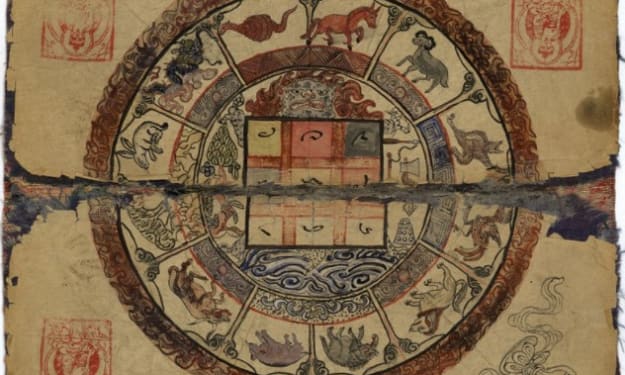
Hair, the ubiquitous appendage of all humans. It comes in many shapes and textures. It runs the gamut from jet black to raspberry red. Its’ texture varies from silky blonde to soft woolen nap. The fact that it's care and styling is an industry of over $93 billion dollars worldwide and $20 billion in the United States speaks to it importance in the lives of humans. Have you considered that your hair may be more than just something to make you look good? This can be summed up quite nicely in the Biblical aphorism” Hair is a women's glory". Men are included in that pithy saying as well and always have been. Just think of the haircuts, mustache and beard oils, creams and pomades men have used over the centuries but are just now more noticeable.
Is there a more subtle knowledge associated with hair? That seems plausible given its pervasiveness. Let’s explore some of these more subtle meanings and implications of hair. At one time in the Western world the beard was extremely popular and then being clean shaven (for men) came into vogue. In the modern era the clean-shaven man only became popular in the 1920s. Before that the Romans adopted the clean shaven look to imitate Alexander, The Great who adopted to be clean shaven in opposition to most of Greek culture. One of the clearest expressions of manliness was the beard as it distinctly separated males from females. Ancient cultures recognized the sun as a god in some instances and as a symbol in others. The sun with its light caused people to be able to see in the day. During this “daylight” man was able to see, work, and acquire knowledge and wealth. The ancient people then associated the sun light with knowledge or the enablement of knowledge. In a patriarchal society men wanted to be representative of this great knowledge seen in the sun. When they looked up at the sun they would see the sun rays coming out from all around the sun’s orb. It was surmised that man in his ability was also spreading and enabling knowledge like the sun. Therefore man wore hair all around his head and face to symbolize the knowledge that he was spreading and enabling in the world similar to the enabling of knowledge by the sun.

How was the association of hair with knowledge made by the ancients? The ancients looked at nature and took their cues from nature. Their premise was that all knowledge is born out of reality. If one’s knowledge is not in reality it can’t be called knowledge and then is ipso facto (by the fact) false.
Looking at another pervasive fact in nature, i.e. birth they would have seen that most babies are born with little to no hair. As the babies grows so goes the growth of the hair. For the male child (remember patriarchy) they saw hair growth on the face and the genitals as a sign which indicated maturity, accountability, and responsibility. My sense is that females have an almost symbiotic relationship with hair as they grow up in intimate relationship with dolls and the association with hair. The discussion of women and hair would be similar but different in many aspects. Women's mysterious relationship with hair would have to be addressed separately. All things being equal the knowledge of the individual was growing similarly to the growth of hair.
The facial hair not only gives the male the appearance of maturity but it is an indication that he is, actually maturing. So hair is a natural sign or an indication that the body is going through this maturation process. The ancients follow the dictum as above so below and as without so within. They surmised that the outward sign of hair growth was an indication of the growth of knowledge within the individual. They also surmised that knowledge followed a pattern of growth similar to the growth of the hair.
We can see by people who indulge in unnecessarily dangerous and reckless behavior that as we grow older our knowledge doesn’t necessarily grow along with our hair.
As we grow older our knowledge doesn't necessarily mature, but our insight towards it should. "The People Champ," Muhammad Ali said, "The man who believes the same way at fifty years old as he did at twenty has wasted thirty years of his life." The growth of hair is an insight into how knowledge should grow generally not how it has grown in any particular individual. The latter has to do with environment, education, and experiences. The hair is just a sign.
And just like with our physical body our knowledge follows a natural pattern. It first appears on our head which is where we do our thinking. Cognitive science has documented that babies do think. Therefore the ooh ohh gaa gaa baby talk may not be age appropriate for newborns. As the individual’s hair grows so his or her knowledge is supposed to grow.
Another association with hair has to do sensitivity and spirituality. Many people have experienced a little ant or even smaller bug crawling on their arm, leg or head. They were alerted to this fact by the hair.
Yogis posit that hair is an extension of the nervous system. It has been written that hair is exterior nerves. As it transmits the almost imperceptible physical sensation of little creepy crawlers, it also can transmit unseen information to the brain stem, limbic system and the neocortex. This has yet to validated scientifically. However the conservatively the 5,000 year old tradition of yoga deserves some credence in this respect.
A complete discussion the the mystery of hair in the various cultures around the world is worthy of volumes. I am sure some already exist. All in all I think we can say a beautiful head of hair is more than just a pretty face.
About the Creator
Abdul Al Hakim
Writing with interests in science, technology, human development, mysticism, and finance.






Comments
There are no comments for this story
Be the first to respond and start the conversation.